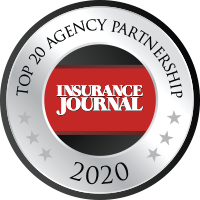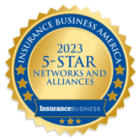Charlie Walker, a long-standing pillar of The Iroquois Group team, joins the Trusted Advisor Podcast and his comments will resonate with agents, carrier reps and customer service folks alike. He tells us how he basically fell into the insurance industry, stuck with it, and eventually became an E&O expert.
Edwin K. Morris (4s):
Welcome to the trusted advisor podcast brought to you by Iroquois group. Iroquois is your trusted advisor in all things insurance. I am Edwin K. Morris. Today we’re speaking with Charlie Walker and he has a wealth of experience in the property and casualty realm of insurance. He’s held a consulting role in the insurance field for over 50 years. Charlie graduated from Le Moyne college in Syracuse, New York, and has continued his education many times through the insurance Institute of America. How did you fall into the insurance business?
Charlie Walker (38s):
Well, I fell into the insurance business probably because my grandfather started in the insurance business around 1910 and in 1934, he started the Charles A. Walker corporation in Syracuse, New York. In 1990, I sold the Charles A. Walker corporation to my son and some partners. I joined the Iroquois organization on January 1st, 1991. So the Charles J. Walker corporation, well, it goes back 75 years. And my involvement in the insurance business goes back to 1963.
Edwin K. Morris (1m 14s):
What was the transition from the sales piece of that to the entry point coming into Iroquois?
Charlie Walker (1m 20s):
Well, it was, it was completely different and yet it was exactly the same. I spent most of my career up until Iroquois as a managing agent and a managing general agent for insurance companies. In other words, I handled their agency plant in the state of New York. I was not an employee of those companies. I was an independent contractor. So really joining Iroquois, while there were some very obvious differences, it was still the same skillset that I had used all through my career.
Edwin K. Morris (1m 50s):
Got it. What was your formal training other than the family business to even follow suit when the, in the industry?
Charlie Walker (1m 56s):
Well, I’m a proud graduate of Le Moyne college class of 1963 in Syracuse, New York. And when I entered the insurance business, like many people entering the insurance business, I had absolutely no idea what was going on probably for the first three or four years. But as I began to understand how the insurance mechanism worked, I realized that if I wanted to get where I wanted to go, I needed to have some higher education in that specialty. So I decided that I was going to do the coursework and the hard work to earn the designation of chartered property and casualty underwriter.
Charlie Walker (2m 36s):
The CPCU designation in the insurance industry is roughly the equivalent of a CPA in the accounting business. It’s someone who has taken some extensive courses of study and has passed written examinations that are offered on a national basis. And once you pass those examinations and you show you’re a, you’re a good character, you are awarded the designation of CPCU, as I said, very similar to a CPA designation
Edwin K. Morris (3m 8s):
And that is good for the individual, but what does that bring to an agency?
Charlie Walker (3m 12s):
What it brings to an agency is someone who has really worked on learning the ins and out of the insurance industry. There are many designations in insurance, CPCU CIC, which is certified insurance counselor, associate and risk management, ARM, associate in underwriting, AIM. All of these are awarded by national organizations that offer the coursework and monitor the examinations so that many insurance agents feel that having those designations shows their dedication to their profession,
Edwin K. Morris (3m 45s):
That makes sense. Has that ended up being a, an Achilles heel for some agencies?
Charlie Walker (3m 49s):
Strange you should say that because I was the one, when I was told we were going to talk about this part before we went on to E&O, I was thinking that when it comes to insurance agents, professional liability, in some ways, having those designations is a problem because in the event that, that you get involved in a legal situation as a CPCU or a CIC or whatever designation you may hold, the carts are going to hold you to a higher standard of duty. In other words, you got that designation. So you better be smarter than the average bear.
Edwin K. Morris (4m 25s):
I see, because that puts you at a higher fidelity of knowing what you did or shouldn’t have done.
Charlie Walker (4m 31s):
Exactly. But if you did the work and you did the study then you better know that stuff
Edwin K. Morris (4m 35s):
You talked about the E&O policy, errors and emissions, can you speak to that next?
Charlie Walker (4m 40s):
A fast course in insurance agents’ professional liability insurance. How does that sound?
Edwin K. Morris (4m 46s):
Wow.
Charlie Walker (4m 47s):
If an insurance agent screws up, you should excuse the expression. And somebody has a loss that isn’t covered because he didn’t do the right thing. He’s liable just like you’re liable if somebody trips on your front step. And they are, and they’re able to sue him for their damages. And since professional liability is excluded for most liability policies, an insurance agent needs to protect himself with a specific policy called an insurance agents’ professional liability policy, which protects him from suits and sums that he may be liable to pay arising out of his activities as an insurance agent.
Charlie Walker (5m 31s):
Does that sound right?
Edwin K. Morris (5m 33s):
You’re holding all the cards on that one. I’m not sure.
Charlie Walker (5m 37s):
I was afraid you hung up on me.
Edwin K. Morris (5m 40s):
Did that cover the errors and omissions, kind of the basic functions?
Charlie Walker (5m 45s):
Basically. I mean, anybody that is involved in the, in the insurance business understands what professional liability or E&O insurance, errors and emissions insurance is.
Edwin K. Morris (5m 56s):
It’s a necessity, right? I mean, it’s not, I guess it’s an option.
Charlie Walker (6m 0s):
It’s an option, but it’s a, it’s a necessity. Yes.
Edwin K. Morris (6m 3s):
Cause it can end up being a very expensive gamble, right.
Charlie Walker (6m 7s):
Very expensive. And it’s definitely a necessity. If someone wants to become a member agency of Iroquois, because we require that all of our member agencies maintain professional liability insurance in a B plus or better rated carrier with sufficient limits, which we consider to be a million dollars combined single limits.
Edwin K. Morris (6m 31s):
So how do you help them with this?
Charlie Walker (6m 34s):
My involvement, Edwin, is this way: when one of the managing partners or one of the regional managers submits a new member to the office in Allegheny, the submission is reviewed by the folks down there. And one of the things they review is one of the questions that’s asked is, does he have E&O insurance? And if he does, we want to see a copy of the declarations page of the policy, which is going to tell us what his limits of liability are and what company is underwriting the policy. We have a list of acceptable carriers,. The folks in Allegheny, Reed and I work very closely on this.
Charlie Walker (7m 16s):
And when Reed comes up with a new member submission, and he has a question about whether the E&O coverage that was submitted is, is sufficient. That’s when I get involved
Edwin K. Morris (7m 29s):
A protection for the agency, as much as it is for you guys.
Charlie Walker (7m 33s):
Right. Certainly. And we want to make sure that member is protected by a policy that was underwritten by a carrier that we know is financially sound, and that the policy he purchased doesn’t have problems within it that might preclude coverage that he needs. And that’s, as I said, that’s where I come into the, into the mix.
Edwin K. Morris (7m 55s):
What would be your best advice for an organization that is not part of the membership of Iroquois?
Charlie Walker (8m 1s):
Certainly my best advice once they’ve been approached by Iroquois is to make sure that it’s a good fit, that Iroquois has the types of products that they need, and that they understand what Iroquois’ requirements are. Obviously Iroquois requirements are that they have a need for the products we offer, that they’re willing to sell these products, that they’re willing to abide by the rules both of Iroquois and the carrier, and that they provide us with proof that they have professional liability insurance, which not only protects them, but it also protects us.
Charlie Walker (8m 42s):
Insurance is a very unique topic. And it’s a very unique product. One of the primary things that, one of the things of primary importance in insurance it’s, it’s referred to as a contract of utmost good faith. And that means that insurance agents have to act in utmost good faith when they deal with their clients, because the clients don’t know what what’s going on. So insurance agents need to act in a manner that, where they’re, they’re keeping the client’s interests above their own. This is very much like Iroquois. I mean, you know, we all deal with Laurie Branch within Iroquois and Laurie is without a doubt in my lifetime one of the most honest people, most honorable people that I’ve ever met, Laurie is not willing to put up with any kind of dishonest acts or trying to kid her or anything else.
Charlie Walker (9m 41s):
And this goes all the way down through the ranks of the managing partners, guys on the street (the regional managers), and certainly was very important to me in my dealings with Iroquois over the last almost 30 years. And that goes through the whole organization. I mean, if you talk to anybody, if you talk to Kelsey’s dad, Ted, or Greg Chiapuso or, or Matt Ward, they, they would all agree with me that at the top of the list within Iroquois is acting with utmost good faith all the time.
Edwin K. Morris (10m 17s):
Thank you very much for sharing your long history and experience with this podcast. It’s been a lot of fun. Thanks for listening to this edition of the trusted advisor podcast brought to you by Iroquois group. Iroquois, your trusted advisor for all things insurance, and remember get out of the office and sell. This program was recorded live at the Cohen multimedia studio on the grounds of Chautauqua institution. I am Edwin K. Morris, and I invite you to join me for the next edition of the trusted advisor podcast.


